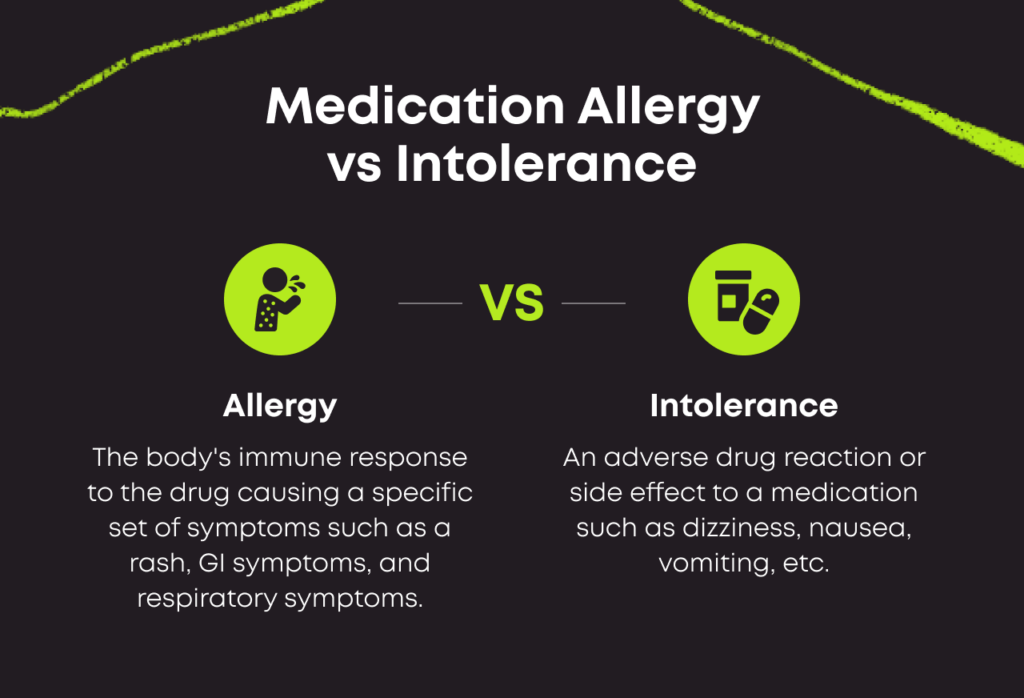%20(1).jpg)
Any drug has the potential to cause an allergic reaction, including Suboxone. The rates of true “allergy” to Suboxone are quite low. Much more common is an “intolerance” to Suboxone.
An allergy and an intolerance are different. Learn more about each here.

An allergy to a medication involves an immune response to the drug causing a specific set of symptoms, usually rash, GI symptoms, and respiratory symptoms. Minor allergic reactions usually involve a rash or GI upset. A more serious allergic reaction is generally characterized by swelling, difficulty breathing, and loss of consciousness.
An adverse drug reaction, also called an “intolerance”, is much more common, and much less concerning. This essentially means any side effect to a medication. Suboxone can cause a number of intolerances or side effects. Common side effects include dizziness, nausea, vomiting, loss of libido, sedation or sleepiness.
While exceedingly rare, it’s possible to experience an allergic reaction to Suboxone, just like it is possible to have an allergic reaction to practically any medication.[1]
There are 2 medications in Suboxone: Buprenorphine and Naloxone. Either medication can potentially cause an allergic reaction. However, bare in mind that the rates of allergic reactions or anaphylaxis to both Buprenorphine and Naloxone are both exceedingly rare.
Signs of a true allergic reaction include rash (usually full body), itching, acute stomach cramping and diarrhea, and – most concerningly – lip or tongue swelling, throat swelling or difficulty breathing.
If you experience any of the following symptoms while on Suboxone, you should seek immediate medical attention:
If you think you may be experiencing an allergic reaction or any other symptoms that may be life-threatening, call 911 and treat the situation as a medical emergency. Be prepared to give the 911 operator your medical history, current location, symptoms, and a list of any drugs you have taken, including illicit and recreational substances.
Unlike anaphylaxis or true allergy, an intolerance is not a medical emergency. You may experience side effects or intolerances while on Suboxone, including dizziness, nausea, vomiting, loss of libido, sedation or sleepiness.
If your symptoms are mild and stable, the first thing to do is to contact your doctor. Oftentimes, mild reactions can be fixed by adjusting the dose of medication you’re taking, but this should only be done with the help of a doctor. Don’t attempt to adjust your medication on your own.
Drug interactions aren’t always serious, but they can be. Even if a reaction isn’t serious, it’s possible that your medications aren’t working as intended and that a change in your prescriptions may improve your treatment experience. A good rule of thumb with any medication is to call your doctor when experiencing any symptoms you didn’t expect.
%20(1).jpg)
Elena Hill, MD; MPH received her MD and Masters of Public Health degrees at Tufts Medical School and completed her family medicine residency at Boston Medical Center. She is currently an attending physician at Bronxcare Health Systems in the Bronx, NY where she works as a primary care physician as well as part time in pain management and integrated health. Her clinical interests include underserved health care, chronic pain and integrated/alternative health.
Our science-backed approach boasts 95% of patients reporting no withdrawal symptoms at 7 days. We can help you achieve easier days and a happier future.
Get Startedor book an enrollment call